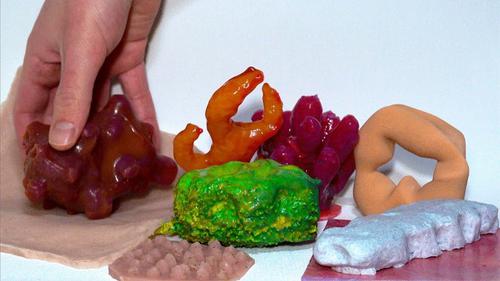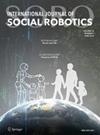“它带来了良好的氛围”:探索柔性个人机器人设计中的生物形态美学
IF 3.7
2区 计算机科学
Q2 ROBOTICS
引用次数: 0
摘要
软体机器人的柔性体为与人类的互动提供了令人兴奋的新可能性。在本文中,我们提出了一种新的设计范式,即“软生物形态”(Soft Biomorphism),其核心思想是放大软机器人固有的生物形态美学品质,并将其激活为人类互动的启示。根据这种方法,我们开发了一套生物形态的软体机器人原型,并进行了两项研究,以了解生物形态设计美学对人们对这些原型印象的影响。基于通过五次研讨会收集的定性数据,第一项探索性研究(n = 10)试图调查个人机器人原型的设想用途和交互类型。我们发现,考虑了各种用途,大多数参与者将生物形态美学设计与软机器人的情感和身体健康联系在一起。在这些结果的基础上,我们进行了第二项研究(n = 32),以调查具有增强生物形态品质的软机器人是否被认为更有吸引力,更适合以支持福祉为目的的人机物理交互。我们没有发现任何统计上显著的生物形态软机器人偏好。然而,我们发现一些原型在互动后的吸引力评分有统计学上的显著差异,这表明与软机器人的物理互动会影响感知的吸引力。基于我们的研究结果,我们强调了在软个人机器人设计中考虑生物形态美学时要牢记的关键问题,并提供了初步的设计建议,以结合生物形态和几何元素,并在未来的机器人设计中协调视觉外观,触感和运动。本文章由计算机程序翻译,如有差异,请以英文原文为准。

“It Brings the Good Vibes”: Exploring Biomorphic Aesthetics in the Design of Soft Personal Robots
Abstract The flexible bodies of soft robots provide exciting new possibilities for interaction with humans. In this paper, we propose a novel design paradigm, Soft Biomorphism, for soft robots centered on the idea of amplifying their inherent biomorphic aesthetic qualities and activating these as affordances for human interaction. Following this approach, we developed a set of biomorphic soft robotic prototypes and conducted two studies to understand the effects of biomorphic design aesthetics on people’s impressions of these prototypes. Based on qualitative data collected through five workshop sessions, the first exploratory study (n = 10) sought to investigate the envisioned uses and types of interactions that prototypes elicited within the context of personal robots. We found that various uses were considered and that most participants associated the biomorphic aesthetic design with soft robots contributing to emotional and physical well-being. Building on these results, we conducted a second study (n = 32) to investigate if soft robots with enhanced biomorphic qualities are perceived as more appealing and appropriate for physical human–robot interaction aimed at supporting well-being. We did not find any statistically significant preference for biomorphic soft robots. However, we found statistically significant differences in appeal ratings post-interaction for some prototypes, suggesting that physical interaction with soft robots can impact the perceived appeal. Based on our findings, we highlight key issues to bear in mind when considering biomorphic aesthetics in soft personal robot designs and provide tentative design recommendations to combine biomorphic and geometric elements and align visual appearance, tactility, and movement in future robot designs.
求助全文
通过发布文献求助,成功后即可免费获取论文全文。
去求助
来源期刊

International Journal of Social Robotics
ROBOTICS-
CiteScore
9.80
自引率
8.50%
发文量
95
期刊介绍:
Social Robotics is the study of robots that are able to interact and communicate among themselves, with humans, and with the environment, within the social and cultural structure attached to its role. The journal covers a broad spectrum of topics related to the latest technologies, new research results and developments in the area of social robotics on all levels, from developments in core enabling technologies to system integration, aesthetic design, applications and social implications. It provides a platform for like-minded researchers to present their findings and latest developments in social robotics, covering relevant advances in engineering, computing, arts and social sciences.
The journal publishes original, peer reviewed articles and contributions on innovative ideas and concepts, new discoveries and improvements, as well as novel applications, by leading researchers and developers regarding the latest fundamental advances in the core technologies that form the backbone of social robotics, distinguished developmental projects in the area, as well as seminal works in aesthetic design, ethics and philosophy, studies on social impact and influence, pertaining to social robotics.
 求助内容:
求助内容: 应助结果提醒方式:
应助结果提醒方式:


